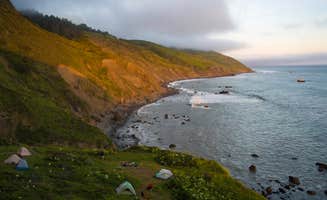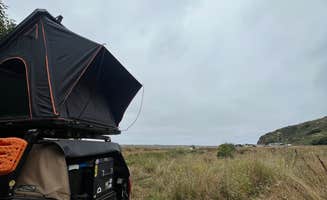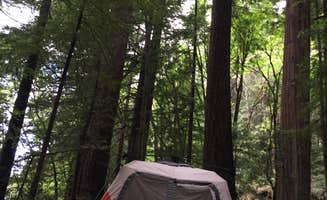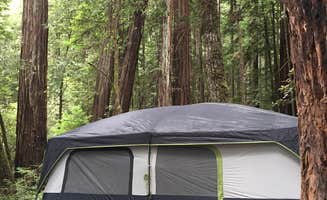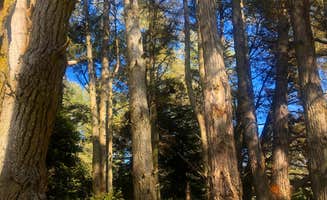Tent camping near Whitethorn, California centers around the remote Lost Coast region where coastal fog can create temperature fluctuations of 20-30 degrees between day and night even in summer. The region includes numerous primitive sites situated along black sand beaches and within redwood forests at elevations ranging from sea level to 2,500 feet. Camping opportunities span from established campgrounds with basic amenities to completely undeveloped dispersed sites requiring self-sufficiency.
What to do
Hike the Lost Coast Trail: Access this 25-mile coastal route from King Range Conservation Area, which offers multiple trailheads. "Black sand beaches, cliffside camping, pristine wilderness and you have it all to yourself! Gorgeous hike, a little rough due to sand and rocks but well worth the effort," notes Jessica M. about King Range Conservation Area.
River activities: Set up camp along the Mattole River at A.W. Way County Park, where sites offer direct river access. "This is a very family friendly lazy river camping area. Camp sites are flat. Deer and skunks frequent the area. dog-friendly," reports JoJo H., adding that "River is usually low on water in the summer months."
Wildlife observation: Early morning and dusk provide opportunities to see coastal wildlife. A camper at Usal Beach Campground observed "mama and baby bear prints on the sand" after camping on the beach. Deer are common throughout the area, especially in meadow areas near campgrounds.
What campers like
Remote beach access: Campers consistently rate the seclusion of these coastal camping areas highly. "Very long road but absolutely wonderful site. It's literally your own private beach for the night," writes Samuel C. about Usal Beach Campground.
Uncrowded camping areas: Fall offers fewer crowds at many sites. "I've heard that this place can get crowded during the summer months I'm glad we waited until fall. Definitely off the beaten path," notes John L. about his Lost Coast Trail experience.
Community atmosphere: Camp Mattole creates opportunities for camper interaction. "The other people camping were really fabulous. Super laid back. A lot of younger hikers and older hippy types all hanging out together and often sharing meals amongst other campers. A true community of people," explains Ann N.
What you should know
Road conditions: Many campgrounds require driving on unmaintained roads. One visitor to Usal Beach notes, "The 45 min dirt road was filled with amazing views early morning," while another advises, "The road was a bit rougher than expected (took us roughly 45 min from the paved road to camp). People made it down in mini vans but I personally wouldn't try it."
Water availability: Bring your own water to most sites. Nadelos Campground offers potable water, but water systems at other campgrounds may be unreliable or nonexistent. Camp Mattole requires campers to "haul your own water in" according to visitor feedback.
Wildlife precautions: Bears and other wildlife frequent the area. Store food securely at all sites. A visitor at Usal Beach reported seeing "coyotes when setting up camp, but they didn't mind us," while another mentioned, "I think a bear visited us in the night but it was not an issue" at Nadelos Campground.
Tips for camping with families
Spacious sites: Look for flatter, more accommodating areas for family setups. Spencer J. notes that Nadelos Campground "easily accommodated a large group. Stayed here on a school trip with a group of over 50 people and we had plenty of room."
Consider insects: Spring camping brings more bugs. "We visited in the spring and it was pretty buggy, but not unmanageably so," reports a visitor to Nadelos Campground.
Lock up valuables: Secure gear, especially food. At Williams Grove Group Camp, one group leader advised, "We were there as a group with Cubscouts and Boy Scouts and on the 2nd night had about $500 worth of food and gear stolen while we were sleeping. Definitely lock up or put away your gear at night."
Tips from RVers
RV size limitations: Most campgrounds near Whitethorn cannot accommodate large RVs due to narrow, winding roads and limited turning radius. Small trailers and campervans under 20 feet have better access options.
Bring recovery equipment: Soft sand and muddy conditions can cause vehicles to get stuck. Robert S. recommends "4x4 during the wet seasons and some recovery gear just in case" when visiting Usal Beach, adding "Had to pull someone out last trip, which made the adventure even better!"
Consider alternative camping styles: Horse Mountain Campground offers a primitive but accessible option. "It's an old abandoned camp that is now free to use because it is no longer maintained. There are a few picnic tables and lots of trees. Road around camp is still drivable," according to Stephanie S.


